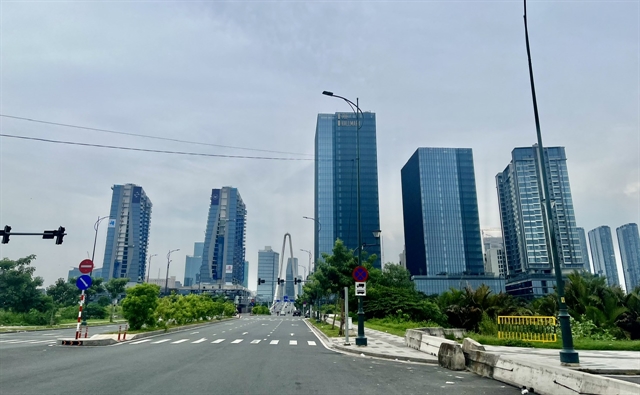 Economy
Economy


|
| New real estate developments in Thủ Thiêm New Urban Area in HCM City, where Lotte’s long-delayed Eco Smart City project is located. — VNS Photo Bồ Xuân Hiệp |
HCM CITY — South Korean conglomerate Lotte Group has formally requested to withdraw from its long-delayed US$884 million Thủ Thiêm Eco Smart City project in HCM City, citing regulatory delays, rising costs, and unresolved legal obstacles, a move that has sparked concern among top Vietnamese lawmakers about its economic and reputational implications.
The high-profile project, located in the Thủ Thiêm New Urban Area, was approved in 2017 and envisioned as a landmark mixed-use smart city development.
Despite a ceremonial groundbreaking in 2022, the 7.4-hectare site remains undeveloped nearly eight years after the initial agreement, due to protracted delays in financial settlements and shifting policy frameworks.
“The investor has notified the city of its inability to continue and has requested to return the land,” a senior official at the HCM City Department of Finance confirmed.
The formal withdrawal request, submitted by Lotte Properties HCM City in August, followed the city’s final approval of the land use valuation in June, set at VNĐ16.19 trillion ($670 million).
Lotte contends that delays in the government’s land appraisal process resulted in late payment penalties amounting to several trillion Vietnamese đồng — costs it says were beyond its control.
Originally planned to feature 11 towers of up to 50 storeys, the Eco Smart City project was set to include luxury residences, hotels, retail spaces, and office buildings. Lotte had described it as a “strategic investment” aligned with Việt Nam’s rapid urbanisation and regional smart city ambitions.
Although the contract was signed in July 2017, construction has yet to begin. Lotte has cited multiple challenges, including lengthy approval procedures, legal uncertainties, policy changes, and escalating costs, all of which have made the project “financially and operationally unfeasible.”
Threat to investment climate
The project’s collapse has drawn criticism from National Assembly leaders, who say it underscores deeper issues in project governance and poses a threat to Việt Nam’s investment climate.
“This is a significant waste,” said Phan Văn Mãi, chairman of the National Assembly’s Economic and Financial Committee, during a legislative session on the draft Law on Thrift Practice and Anti-Waste held on Monday.
“A valuable land parcel may now remain idle for years. That’s not just economic waste — it damages investor trust and the broader business environment,” he added.
Mãi also pointed to administrative shortcomings, noting that Lotte was compelled to bear late-payment costs despite the delays stemming from state-side inefficiencies.
“This example shows how rigid enforcement and delayed decision-making can result in both tangible losses and an erosion of public and investor confidence,” he said.
Vũ Hồng Thanh, vice chairman of the National Assembly, also weighed in, arguing that the distinction between “thrift” and “waste” is often unclear in infrastructure planning.
“We need clearer legal definitions to separate cost-saving discipline from cost-cutting that leads to inefficiencies,” he said, calling for reforms in how such projects are evaluated and managed.
Project in legal limbo
Despite Lotte’s withdrawal request, the company remains the project’s official investor.
Under Việt Nam’s Investment Law, termination requires submission of formal documents, which Lotte has yet to provide.
As a result, the project remains in legal limbo, further complicating the future of the land and any potential redevelopment plans.
The site, now in An Khánh Ward, had been identified as a central feature in the city's long-term vision for Thủ Thiêm, a financial and innovation hub on the east bank of the Sài Gòn River.
Lotte’s planned exit marks a rare retreat from one of its largest overseas ventures. The group has expanded aggressively in Việt Nam over the past decade, investing heavily in retail, hospitality, and real estate.
The Thủ Thiêm Eco Smart City was once touted as a symbol of South Korea-Việt Nam economic cooperation and urban innovation.
Now, analysts warn that the case could chill foreign investor sentiment, particularly in sectors exposed to Việt Nam’s complex land-use laws and regulatory processes.
As of press time, Lotte has not issued an official statement on the withdrawal or its future investment plans in Việt Nam. — VNS